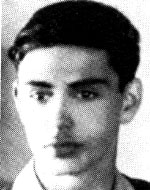Haglili, Shaul (Arnon)
Son of Nechama and Avraham. He was born in the city of Lida in 1920. After completing his studies in his hometown he immigrated to Eretz Israel in 1938. After arriving in Israel, he joined the Betar enlistment unit in Nahalat Yitzhak near Jerusalem (” ), Whose mission is to secure Hebrew transportation on the Jerusalem-Tel Aviv highway. The members of the company supported the work of a quarry near their place of residence. Where he also joined the ranks of the Irgun Zvai Leumi. At the time of the split in the Irgun in the summer of 1940, he joined the “Yair” faction, which was first called the Irgun Zvai Leumi (National Military Organization in Israel) and later the Fighters for the Freedom of Israel (Lehi). Shaul left the company, went to Jerusalem, where he began to operate in the new underground and his nickname “Arnon”. In 1941 he was arrested and imprisoned in the detention camp in Mizra, in the north of the country. He was later released from the camp but was arrested again and transferred to the Latrun camp. Thanks to his ability to establish ties with the camp supervisors and knowledge of the English language he diligently studied, he was chosen as the representative of the detainees to the camp authorities. On November 11, 1943, he was among 20 Lehi detainees who had escaped from the Latrun camp in a tunnel they had dug for many months, and in November 1945 he ordered a sabotage operation at the Lod railway stations and in this operation was discovered in full capacity as a commander and as a member. Was arrested in Haifa after the British recognized him as one of the escapees of Latrun and was transferred to Latrun Detention Camp On December 20, 1945, he was flown with two hundred and fifty-five additional prisoners to Africa, where they were brought to a deportation camp in Samble, Eritrea. 1946), Sudanese soldiers assigned to guard the camp opened fire on the detainees, wounding 12 of them and killing two He was buried in the cemetery of the Jewish community of Asmara, the capital of Eritrea, and after the establishment of the State of Israel his bones were transferred to Jerusalem, to the cemetery in Givat Ram (Sheikh Bader). He put a sister, his name was immortalized in the books “Red Days” and “Those Who Have not Won”.
